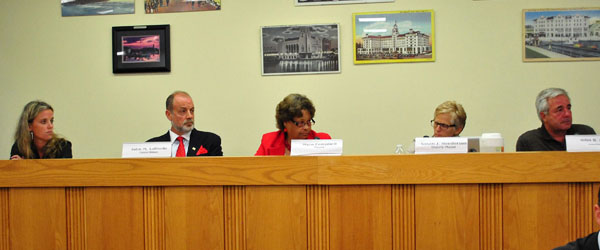Change of government passes with 75 percent approval
Voters will elect new mayor and council next year
The four year term of Asbury Park’s new City Council will be cut short after voters approved a change of government referendum on Tuesday.
An election will take place next year in November to select a new governing body. The current five-member council [above] was sworn in on July 1.
According to unofficial returns from the Monmouth County Clerk, by a vote of 1,201 to 403 — which is 75 to 25 percent — voters approved a package of changes to how the city organizes its government and conducts elections. The clerk’s vote count does not include provisional ballots.
The change of government question was placed on the ballot by the city’s charter study commission, which spent months holding public hearings and considering various options.
Municipal elections will now be moved from May to November. The elections will continue to be non-partisan, where all candidates run in one column without party affiliations. Candidates may continue to group themselves as tickets.
The city manager remains the chief executive officer of the government, responsible for day-to-day operations. The city council continues as five members with four year terms.
However, the mayor — who is one of the council members — will now be directly elected by voters. The mayor’s primary responsibility is to preside at council meetings. Under the old system, the council appointed the mayor.
Terms will now be staggered, with elections every two years. A new mayor and four new council members will be elected in November. Right after their swearing-in, lots will be drawn to determine which two council members will have initial two year terms.
After that two year term, those two seats will have four year terms, setting up the staggering of the elections. The mayor and two council members will be elected in one cycle, and the remaining two council members in another.
The package approved by voters also includes run-off elections. Under the old system, all five council seats were up for grabs at once, and the top five vote getters won. That allowed candidates to win with less than 50 percent of the vote in a crowded field.
For next year’s mayoral race, if no candidate gets over 50 percent of the vote on election day, a run-off election of the top two candidates will be held four weeks later. That will require the winner to get a majority, either in the first round or the run-off.
For the council races next year, four seats will be up at once to establish the rest of the new governing body.
If two council candidates get over 50 percent of the vote, the top four candidates win. If no one gets over 50 percent of the vote, the top eight vote-getters compete in a run-off election four weeks later for the four council seats. [If only one candidate gets over 50 percent of the vote, that candidate wins, and the top six vote getters compete for the other three seats.]
In subsequent election cycles, when only two council seats will be up every two years, if one council candidate gets over 50 percent of the vote, the next highest vote-getter still wins. If no one gets over 50 percent, the top four vote-getters compete for the two seats.
The five-member charter study commission was established by Asbury voters who approved it at last year’s November election. Voters also selected the five commissioners. However, only five candidates ran for the seats, and those five served on the commission: Pam Lamberton, Duanne Small, Rita Marano, Michele Maguire and Randy Thompson.
In August, the commission voted 4-0, with Thompson abstaining, to recommend the package of changes that was approved by voters Tuesday. The commission also had the option of not placing any changes on the ballot.
The current council [above, left to right] is Amy Quinn, John Loffredo, Myra Campbell, Susan Henderson and John Moor. The council appointed Campbell as mayor in a controversial 3-2 vote at the swearing-in on July 1.
———————————————————
Follow the Asbury Park Sun on Facebook and Twitter.














